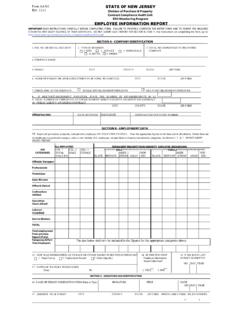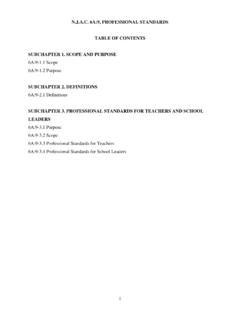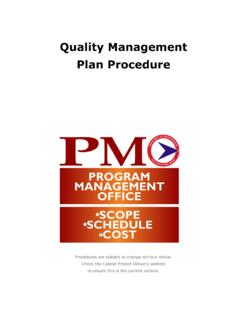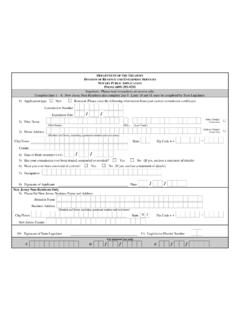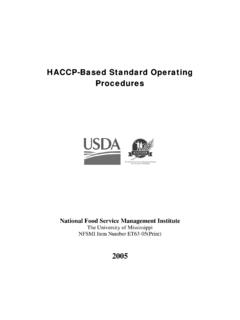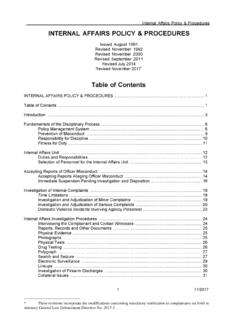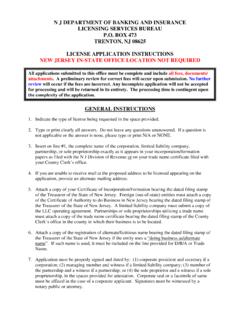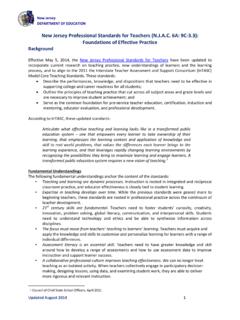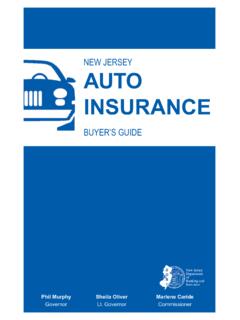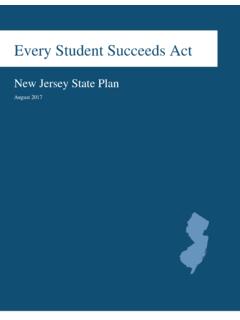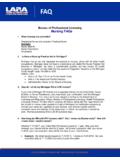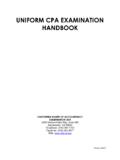Transcription of N.J.A.C. 10:161A - State
1 10:161A This file includes all Regulations adopted and published through the New Jersey Register, Vol. 50 No. 18, September 17, 2018 New Jersey Administrative Code > TITLE 10. HUMAN SERVICES > CHAPTER 161A. STANDARDS FOR licensure OF RESIDENTIAL SUBSTANCE USE DISORDERS TREATMENT FACILITIEST itle 10, Chapter 161A -- Chapter NotesStatutory AuthorityCHAPTER AUTHORITY: 26:2BB-5 through 6, 26:2B-7 et seq., in particular 26:2B-14, 26:2G-1 et seq., 30:1-12, and Reorganization Plan SOURCE AND EFFECTIVE DATE: , effective July 15, : 43 2218(a), 45 1725(a).CHAPTER HISTORICAL NOTE: Chapter 161A, Standards for licensure of Residential Substance Use Disorders Treatment Facilities, was adopted as new rules by , effective July 15, 2013. See: Source and Effective JERSEY ADMINISTRATIVE CODE Copyright 2018 by the New Jersey Office of Administrative LawEnd of 10 This file includes all Regulations adopted and published through the New Jersey Register, Vol.
2 50 No. 18, September 17, 2018 New Jersey Administrative Code > TITLE 10. HUMAN SERVICES > CHAPTER 161A. STANDARDS FOR licensure OF RESIDENTIAL SUBSTANCE USE DISORDERS TREATMENT FACILITIES > SUBCHAPTER 1. DEFINITIONS AND QUALIFICATIONS 10 Scope and applicability(a)This chapter applies to substance (alcohol and drug) abuse treatment facilities that provide residential substance use disorders treatment to adults and adolescents including, but not limited to, halfway houses, extended care facilities, long-term residential facilities, short-term residential treatment facilities and non-hospital-based (medical) detoxification or any other similar such organization. The rules in this chapter constitute the basis for the licensure and inspection of residential substance use disorders treatment facilities by the New Jersey Department of Human Services, Division of Mental Health and Addiction Services (DMHAS).
3 (b)This chapter also applies to hospitals licensed pursuant to 8:43G that offer hospital-based medical detoxification services in a designated detoxification unit or facility or provide any of the modalities of residential treatment listed in (a) above. This chapter, while not requiring a separate license for hospital-based substance abuse treatment facilities, sets out standards with which hospitals providing services covered by this chapter must JERSEY ADMINISTRATIVE CODE Copyright 2018 by the New Jersey Office of Administrative LawEnd of 10 This file includes all Regulations adopted and published through the New Jersey Register, Vol. 50 No. 18, September 17, 2018 New Jersey Administrative Code > TITLE 10. HUMAN SERVICES > CHAPTER 161A.
4 STANDARDS FOR licensure OF RESIDENTIAL SUBSTANCE USE DISORDERS TREATMENT FACILITIES > SUBCHAPTER 1. DEFINITIONS AND QUALIFICATIONS 10 PurposeThe purpose of this chapter is to protect the health and safety of clients by establishing minimum rules and standards of care to which residential substance use disorders treatment facilities must adhere in order to be licensed to operate in New JERSEY ADMINISTRATIVE CODE Copyright 2018 by the New Jersey Office of Administrative LawEnd of 10 This file includes all Regulations adopted and published through the New Jersey Register, Vol. 50 No. 18, September 17, 2018 New Jersey Administrative Code > TITLE 10. HUMAN SERVICES > CHAPTER 161A. STANDARDS FOR licensure OF RESIDENTIAL SUBSTANCE USE DISORDERS TREATMENT FACILITIES > SUBCHAPTER 1.
5 DEFINITIONS AND QUALIFICATIONS 10 DefinitionsThe following words and terms, when used in this chapter, shall have the following meanings, unless the context clearly indicates otherwise:"ABAM" means the American Board of Addiction Medicine, 4601 North Park Avenue, Upper Arcade, Suite 101, Chevy Chase, MD 20815-4520, "Accrediting agencies" means those organizations recognized nationally that set standards and review providers based on these standards. These organizations provide their endorsement in the form of accreditation: Joint Commission, ; Commission on Accreditation of Rehabilitation Facilities (CARF), "Administrator" means an individual appointed by the governing authority to provide administrative oversight for all licensed facilities and individual sites within a licensed facility.
6 "Admitted" means accepted for treatment at a residential substance use disorders treatment facility."Adolescent" means a person between the ages of 12 up to and including the 18th birthday."Adolescent residential substance use disorders treatment facility" means a free-standing residential facility or a distinct part of a facility where care is provided to two or more adolescent clients for the treatment and prevention of substance dependence, under supervision for more than 24 consecutive hours."ASAM" means the American Society of Addiction Medicine, 4601 North Park Ave., Upper Arcade, Suite 101, Chevy Chase, MD 20815, "ASAM Patient Placement Criteria" means the criteria developed by the American Society of Addiction Medicine, contained in "Patient Placement Criteria for the Treatment of Substance Related Disorder," 2d Edition revised (2001) (ASAM PPC-2R)
7 , incorporated herein by reference, as amended and supplemented, which can be obtained from the ASAM Publications Center, 10 "ASI" means the Addiction Severity Index, 5th Edition, incorporated herein by reference, as amended and supplemented, which is an instrument designed to provide important information about aspects of a client's life that may contribute to his or her substance use disorder, as developed and available from the Treatment Research Institute, 600 Public Ledger Building, Philadelphia, PA 19106, (215) 399-0980, "Assistant Commissioner" means the individual responsible for administratively overseeing substance abuse at the New Jersey Department of Human Services, Division of Mental Health and Addiction Services.
8 "Available" means, for individuals employed by or under contract with a residential substance use disorders treatment facility, capable of being reached and able to be present in the facility within 30 minutes."BOCA" means the model building code of the organization formerly called Building Officials and Code Administrators International Inc., now called the International Code Council; which can be obtained at 4051 W. Flossmoor Road, Country Club Hills, IL 60477-5795, , 1-888-422-7233, or from the ICC Store, 1-800-786-4482."Bylaws" means a set of rules adopted by the facility for governing its operation. A charter, articles of incorporation or a statement of policies and objectives, is an acceptable equivalent.
9 "CDC" means the Federal government agency, Centers for Disease Control and Prevention, "CSAT" means the Federal Center for Substance Abuse Treatment within the Department of Health and Human Services, Substance Abuse and Mental Health Services Administration, "Certificate of occupancy" means a certificate issued by a local authority indicating that a building meets building code requirements."Certified Alcohol and Drug Counselor" (CADC) means a person who holds a current, valid certificate issued by the New Jersey State Board of Marriage and Family Therapy Examiners, as recommended by the Alcohol and Drug Committee, pursuant to 42:2D-5 and 13 , accessible at , or (973) 504-6582.
10 "Clear floor area" means room space exclusive of toilet rooms, fixed closets, fixed wardrobes, alcoves or vestibules."Client" means any individual who has applied for or been given a diagnosis or treatment for alcohol or drug abuse at a licensed program under this chapter and includes any individual who, after arrest on a criminal charge, is identified as an alcohol or drug abuser in order to determine that individual's eligibility to participate in a program. In the context of this chapter, client is synonymous with patient or resident."Clinical note" means a written, signed and dated notation made by a licensed or credentialed professional, an approved counselor-in-training (pursuant to 10 (a)2) or other authorized representative of the facility who renders a service to the client or records observations of the client's progress in treatment.
